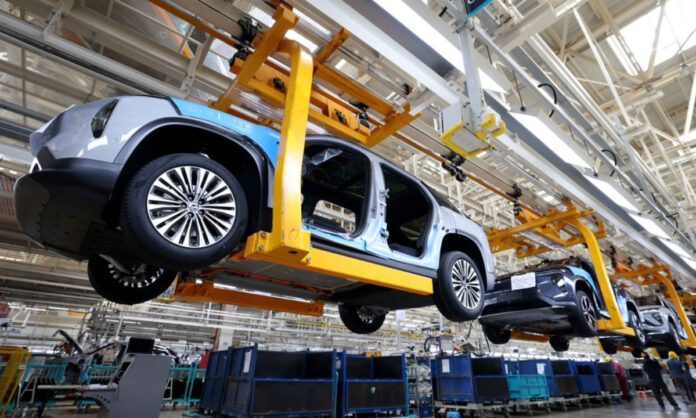Pakistan is leveraging the worldwide surge in Electric Vehicle (EV) popularity, capitalizing on data from the International Energy Agency (IEA) revealing a notable shift in the automotive landscape. A mere five years ago, the ratio of EVs to conventional passenger cars stood at one in every 70, but the most recent statistics for 2022 show a remarkable transformation, with one in every seven newly purchased passenger cars globally being electric.
In a remarkable escalation, the past year witnessed a substantial 55% surge in EV sales, resulting in an impressive aggregate of 10.5 million units sold, as per data compiled by the EV Volumes sales database. Pakistan, demonstrating its astute synchronization with this burgeoning trend, is taking decisive steps to strengthen its position by fostering collaborations with prominent international EV leaders. A recent stride in this direction came to light when Huazi Green Energy, an automotive enterprise formed through a Pakistan-China partnership, unveiled plans to showcase Islamabad’s first electric car later this month, adding yet another milestone to Pakistan’s EV pursuits, as reported by Gwadar Pro on Tuesday.
In a display of proactive engagement, the Pakistani automotive landscape has made strategic strides in tandem with global EV momentum. A notable illustration is a joint venture involving Chinese automaker Huaihai and its Pakistani counterpart, with a substantial $10 million investment earmarked for expanding electric vehicle manufacturing. The initial focus will encompass both two-wheeler and four-wheeler vehicles in the Punjab region.
The pervasive influence of China in the global EV domain is simply impossible to disregard. A staggering 59% share of global EV sales emanates from China, magnifying its standing as the premier EV manufacturer, accounting for a substantial 64% of the worldwide volume. A testament to this domination is BYD, a Chinese EV brand, which witnessed an unprecedented year-on-year surge of 95.8% in cumulative sales during the first half of this year, surpassing its global counterparts. The culmination of China’s EV supremacy was exemplified by the production of the 20 million EV vehicle, an undeniable testament to its authoritative presence.
However, Pakistan’s interest in aligning with China’s EV prowess is not an isolated endeavor, as distinguished global auto conglomerates are vying to seize a slice of China’s EV prosperity. A recent instance involves German automotive giant Volkswagen, which invested a significant $700 million in the leading Chinese smart EV company XPENG. This strategic alliance encompasses a 4.99% stake in XPENG and the collaborative development of two battery electric vehicle (BEV) models, accompanied by an extensive partnership spanning EV platforms, software innovations, and supply chain integration.
This monumental undertaking is considered a watershed moment by automotive experts, signifying China’s transition from a technology-importing nation to an influential exporter. This transformation is poised to sculpt a fresh paradigm of international labor division. A cluster of esteemed Chinese companies, including BAIC, Changan, JAC Motors, Great Wall Motors, MG, FAW, and Chery Automobile, has not only established its presence but also established joint ventures within Pakistan, catalyzing the nation’s journey towards electrification and intelligent automotive solutions.
Acknowledging the embryonic state of Pakistan’s EV infrastructure, pricing dynamics, and localized parts production, experts assert that the nation stands to benefit significantly from technological knowledge transfer facilitated by international titans such as China. A poignant reflection from an automobile vendor in Lahore underscores the potential for learning from Chinese models, as witnessed during a visit to an EV manufacturing hub in the Yangtze River Delta. Here, the seamless integration of a new energy vehicle, incorporating components from diverse regions such as Shanghai, Changzhou, and Ningbo, showcased the remarkable efficiency of the supply chain, offering myriad lessons for Pakistan’s own aspirations.
With an impressive 55% surge in EV sales totaling 10.5 million units in the past year, Pakistan’s emergence as an active player in the EV landscape is underlined by its strategic collaborations with global frontrunners. Notably, the joint venture between Huazi Green Energy, a fusion of Pakistani and Chinese automotive prowess, highlights the proactive approach Pakistan is taking. The upcoming display of Islamabad’s first electric car from this partnership exemplifies a milestone in Pakistan’s EV journey, demonstrating its commitment to driving innovation and sustainable mobility within its borders.
Additionally, the ambitious collaboration between Chinese manufacturer Huaihai and its Pakistani counterpart signals a substantial investment of $10 million to bolster electric vehicle manufacturing. This strategic leap, focusing initially on two-wheeler and four-wheeler vehicles in the Punjab region, paints a picture of Pakistan’s determination to electrify its transportation landscape and leverage international expertise for a cleaner and more technologically advanced future.
Read More:





 Pakistan’s Telecom Sector Has A Bright Future And A Great Potential To Lead Digital Ecosystem
Pakistan’s Telecom Sector Has A Bright Future And A Great Potential To Lead Digital Ecosystem